| Reviews & Columns |
|
Reviews DVD TV on DVD Blu-ray 4K UHD International DVDs In Theaters Reviews by Studio Video Games Features Collector Series DVDs Easter Egg Database Interviews DVD Talk Radio Feature Articles Columns Anime Talk DVD Savant Horror DVDs The M.O.D. Squad Art House HD Talk Silent DVD
|
DVD Talk Forum |
|
|
| Resources |
|
DVD Price Search Customer Service #'s RCE Info Links |
|
Columns
|
|
|
Neon Genesis Evangelion: Volume 7 (Platinum Collection)

Although I'd hardly call myself a hardcore fanatic, I've seen enough Japanese animation to be familiar with the genre. Of all the various shows and films I've had the pleasure of watching (Akira, Ninja Scroll, Macross, Cowboy Bebop, Trigun, etc.), it really amazes me that I'd never really sat down to watch Neon Genesis Evangelion, a short-lived series that first premiered in October of 1995 and aired for less than a year. Since its original broadcast, Evangelion has garnered quite a fan following worldwide, and has even spawned a few feature-length "films" in the process (Death and Rebirth, for example). While it may not feature an earth-shatteringly original concept or plot outline (especially within the boundaries of anime itself), Evangelion is a series that really shines with likeable characters, a strong undercurrent of mystery, and beautiful artwork.
Based on a Japanese comic book series (or manga), Evangelion tells the story of a young man's place in the world, A.D. 2015. Although this young boy (Shinji) has a practically non-existent relationship with his father (Gendo Ikari), he is called to meet with him while the city of Tokyo-3 is under attack by a strange, massive robotic creature known as an "Angel". Apparently, Shinji seems to be one of the keys to combat these Angels, and is asked (actually, more or less ordered) to pilot a technically advanced robot called an "Evangelion". Obviously, this is all a little much to take in at once, and Shinji seems reluctant to jump into such a deadly and dangerous situation. Eventually he reconsiders, determined to follow this new adventure wherever it may lead him.
Part of what makes Evangelion so compelling is its strong undercurrents of religion, philosophy, and basic human psychology. It's common knowledge among fans of Japanese animation that this isn't kid's stuff, and it doesn't pander to its audience. There's a lot to think about here---especially about your own place in the world---and Evangelion has a much deeper and more stimulating premise than a thousand episodes of Pokemon or Yu-Gi-Oh!. To make a long story short, it's rightfully deserving of its huge fanbase and a terrific "gateway drug" for future anime addicts.
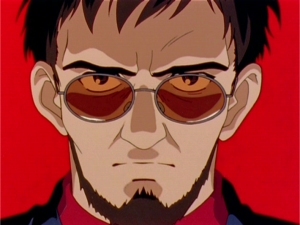
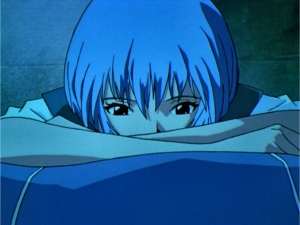
With that said, the only thing that keeps this show from being perfect is the occasional feeling that we've seen bits and pieces of it before, especially in the forms of anime like the previously-mentioned Akira and Macross. It's by no means a cheap imitation, but several key themes and plot devices won't seem as fresh to anyone but those new to the wonderful world of Japanese animation. Still, the show's action-packed, dramatic sci-fi roots help to create a consistently satisfying series, and the mystery of certain characters and situations do a great job of keeping things interesting. During the show's original run, a total of 26 episodes were created. Apparently, Director Hideki Anno actually suffered a nervous breakdown towards the end of Evangelion (most fans agree that the series got very confusing by this point), but it still remains a popular favorite of many anime fanatics.
If you thought Evangelion was a head-scratcher before, you ain't seen nothin' yet. The "final" three episodes are presented here (#24 is shown in its original TV version or as a Director's Cut), and they have the unfortunate task of tying up roughly one billion loose ends. Fans weren't completely satisfied with Episode #26, "Take Care of Yourself", so the events of that episode (and #25, "Do You Love Me?") were combined, expanded, re-worked and re-processed to create The End of Evangelion, a feature-length "film" that presented an alternate ending to the series. No matter if you prefer the series' proper ending or the one seen in End of Evangelion, this seventh volume presents the final three chapters originally seen on television. Before we continue with the technical review of this disc, though, let's have a look at the trio of episodes in question:
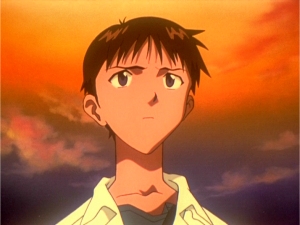
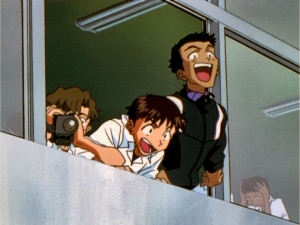
Episode 24: "The Beginning and the End" or "Knockin' on Heaven's Door" (Airdate: March 13, 1996)
The Fifth arrives, while Shinji and new friend Kaowru develop a peculiar relationship. The last Angel is revealed, and quickly takes over Eva 02. After some various instances of death, betrayal and destruction, we inch one step closer to the mind-numbing conclusion.
Additional Director's Cut Footage: Some minor but notable changes here, including Asuka's revelation of the death of another character and an additional scene showing SEELE conversing with Kaowru. As in several earlier Director's Cuts, the animation has also been slightly refined.
Episode 25: "Do You Love Me?" (Airdate: March 20, 1996)
I'll be a little more vague on the last two recaps to avoid spilling secrets, but this episode shows the remaining protagonists coming to terms with their own actions in relation to the War that's taken shape. Ikari also makes final attempts to reunite himself with a certain someone who has passed away. It's a lot to take in (and will likely turn some fans off), but this episode still does a fairly good job of keeping everything organized. The next one's not as smooth, though...
Episode 26: "Take Care of Yourself" (Airdate: March 27, 1996)
The end of the line...sort of. It would be ridiculous to detail this episode, but let's say this: if you haven't paid attention to every aspect of the series up to this point, you're gonna be jaw-droppingly lost (if you did pay attention , you'll just be moderately lost).
OK, it's time to be subjective again. For starters, I couldn't really get behind the last two episodes---especially considering how solid the series had been in earlier volumes---and I doubt I'm alone in saying these closing episodes are the most polarizing of them all. Confusion sets in roughly around Episode #25 and doesn't let up until it's all said and done. I'm glad that The End of Evangelion attempted to clarify many of the details that the final two episodes failed to, but that won't stop many fans from considering this final volume to be an emotional fizzle rather than a bang. By itself, this collection of episodes isn't up to par---but, like the final two seasons of The X-Files and the first season of Star Trek: The Next Generation, completists will want this anyway.
Regardless of opinion, with the end of the series comes the end of ADV Films' fantastic run of Platinum Collection Evangelion re-releases. They've done a terrific job on all seven volumes, but there's no word yet regarding a mega-perfect-invulnerable-alpha boxed set (get your wallets out just in case). For this final volume, ADV keeps the ball rolling nicely; though I would have liked to see even more bonus features included here, the excellent technical presentation is still the real selling point.
Equally impressive is the robust Dolby 5.1 Surround Sound mix, available in the ever-popular choice of an English dub or the original Japanese (with English subtitles). I chose the original language track for the bulk of the viewing session, but also listened to a bit of the English dub as well (which is a quality effort, but I really don't like the idea of dubbing in general). Both tracks exhibited a great amount of punch, and the overall atmosphere and ambience were terrific. This is easily one of the best 5.1 tracks I've heard for any anime series, perhaps bested only by a few miscellaneous DTS tracks (such as those found on the Akira and Cowboy Bebop Perfect Sessions re-issues). Directional effects and LFE are also excellent, and really pull you into the action from the very first episode! If the remastered video wasn't enough of a reason to double dip, the audio easily puts this one over the top.
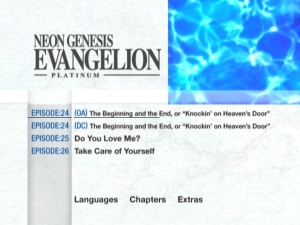
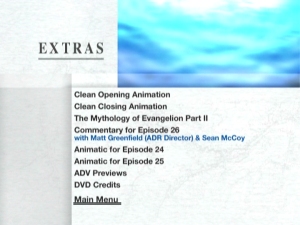
Although the animated menus (seen above) aren't flashy or terribly exciting, they're simply designed and make for very smooth navigation. Each of these three episodes has been broken down into the five customary chapters of most anime shows (Opening Credits, Part A, Part B, Closing Credits, and the Trailer for the next episode), and there was no layer change detected during playback. Packaging was also nicely designed, with brief episode descriptions provided on the back of the keepcase and an attractive overall layout. The keepcase also comes packaged in a sharp looking (but sorta flimsy) "Platinum" slipcover with embossed black lettering. Additionally, a nice 12-page summary booklet is also included for easy reference. As mentioned before, English subtitles are also provided (although for some reason, some of the episodes' opening credits only feature Japanese subtitles).
A slim amount of features on the surface---especially considering this is the final volume---but the inclusion of a few key extras helps this volume get off a little easier. Things starts off with an Audio Commentary for Episode 26, featuring ADR Director Matt Greenfield and lecturer Sean McCoy. This is a bit more serious than past tracks (and rightfully so), as Greenfield and McCoy go a bit further into the show's core philosophy and thematic undertones. The explanation continues with a short featurette, The Mythology of Evangelion Part II (8 minutes), which shows the pair going into even more detail. There's also two seperate Animatics for Episode 24 and 25, as well as the usual Clean Versions of the opening and closing credits. There's also a handful of Trailers for other ADV releases (including Area 88 and Gatchaman, among others). Sure, it would've been nice for ADV to go all out with the extras, but I can't really complain---after all, this disc is pretty stacked compared to most anime releases.
No matter if you liked how Evangelion ended or not, there's no argument that ADV has done a fantastic job on these Platinum re-releases. With strong technical presentations and bonus features, all seven volumes in the series are fine examples of how to re-visit a classic series. While there were a few complaints along the way (especially with the gradually decreasing number of episodes in each volume), these Platinums are easily the best DVD options for fans of Evangelion...until the next editions come out, of course. If you absolutely hate these episodes and everything they stand for, you'll at least want to rent this disc to check out the Director's Cut and other extras. Everyone else can consider this volume (and especially the other six) Recommended.
Randy Miller III is an art instructor hailing from Harrisburg, PA. To fund his DVD viewing habits, he also works on freelance graphic design and illustration projects. In his free time, Randy enjoys slacking off, general debauchery, and writing things in third person.
|
| Popular Reviews |
| Sponsored Links |
|
|
| Sponsored Links |
|
|
| Release List | Reviews | Shop | Newsletter | Forum | DVD Giveaways | Blu-Ray | Advertise |
|
Copyright 2024 DVDTalk.com All Rights Reserved. Legal Info, Privacy Policy, Terms of Use,
Manage Preferences,
Your Privacy Choices | |||||||













